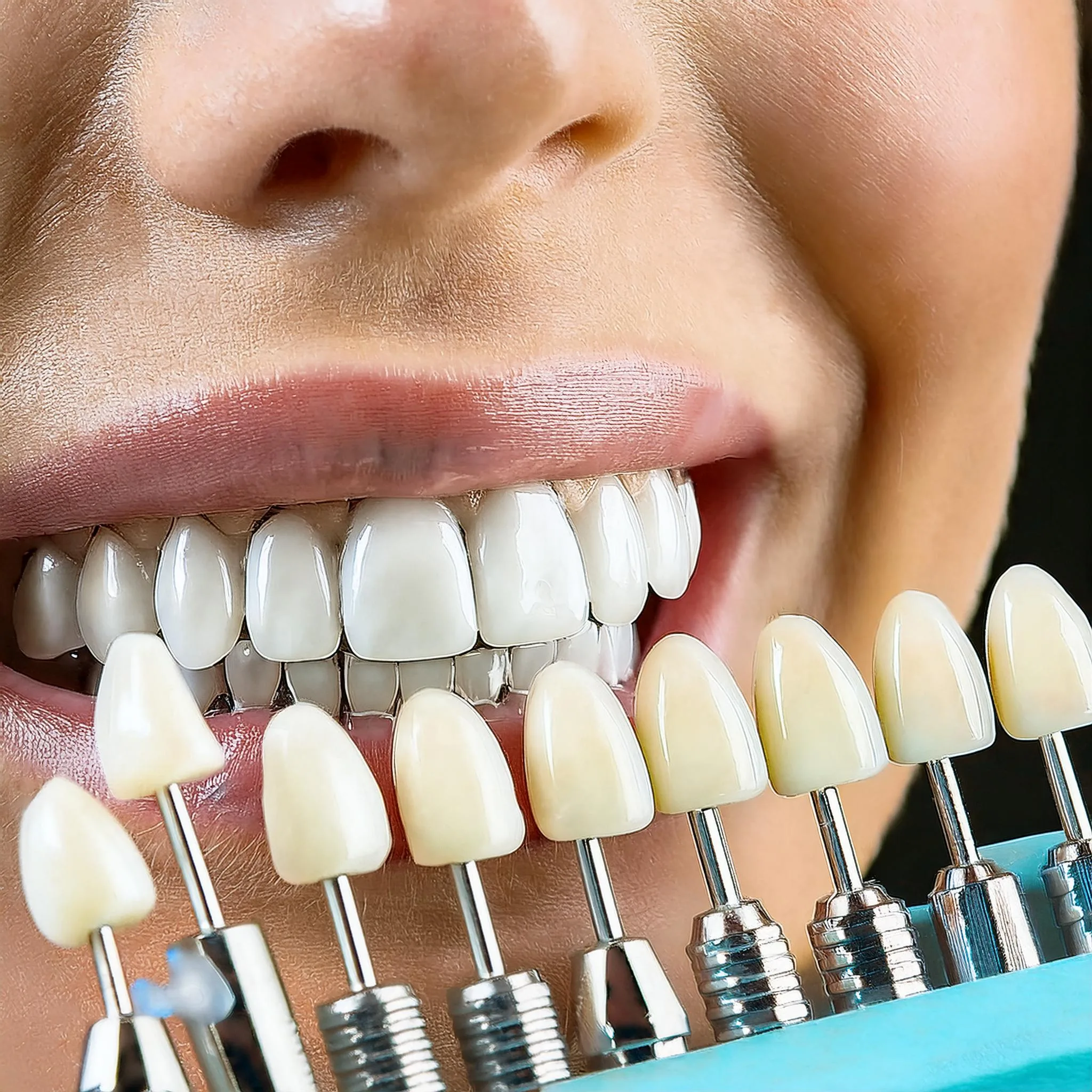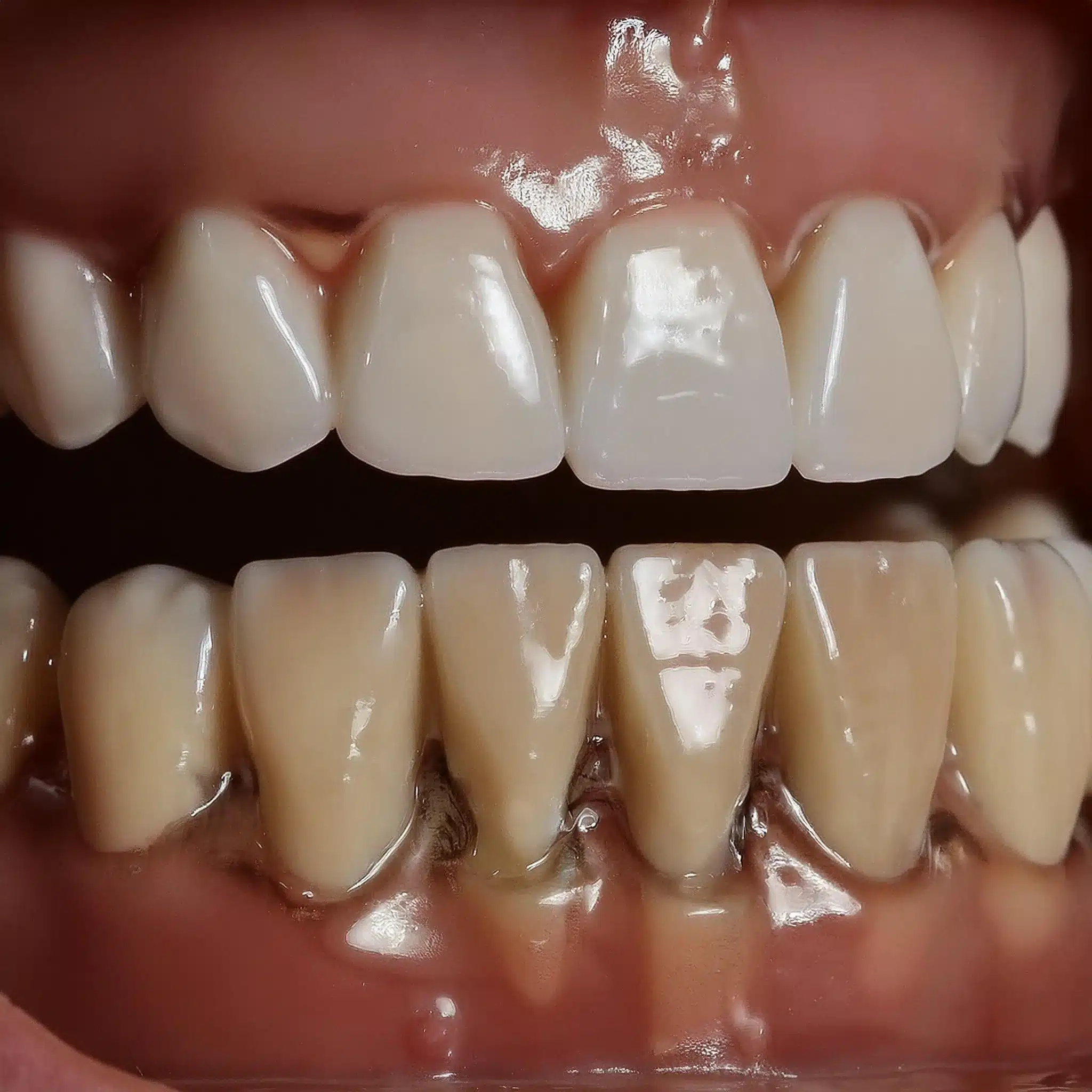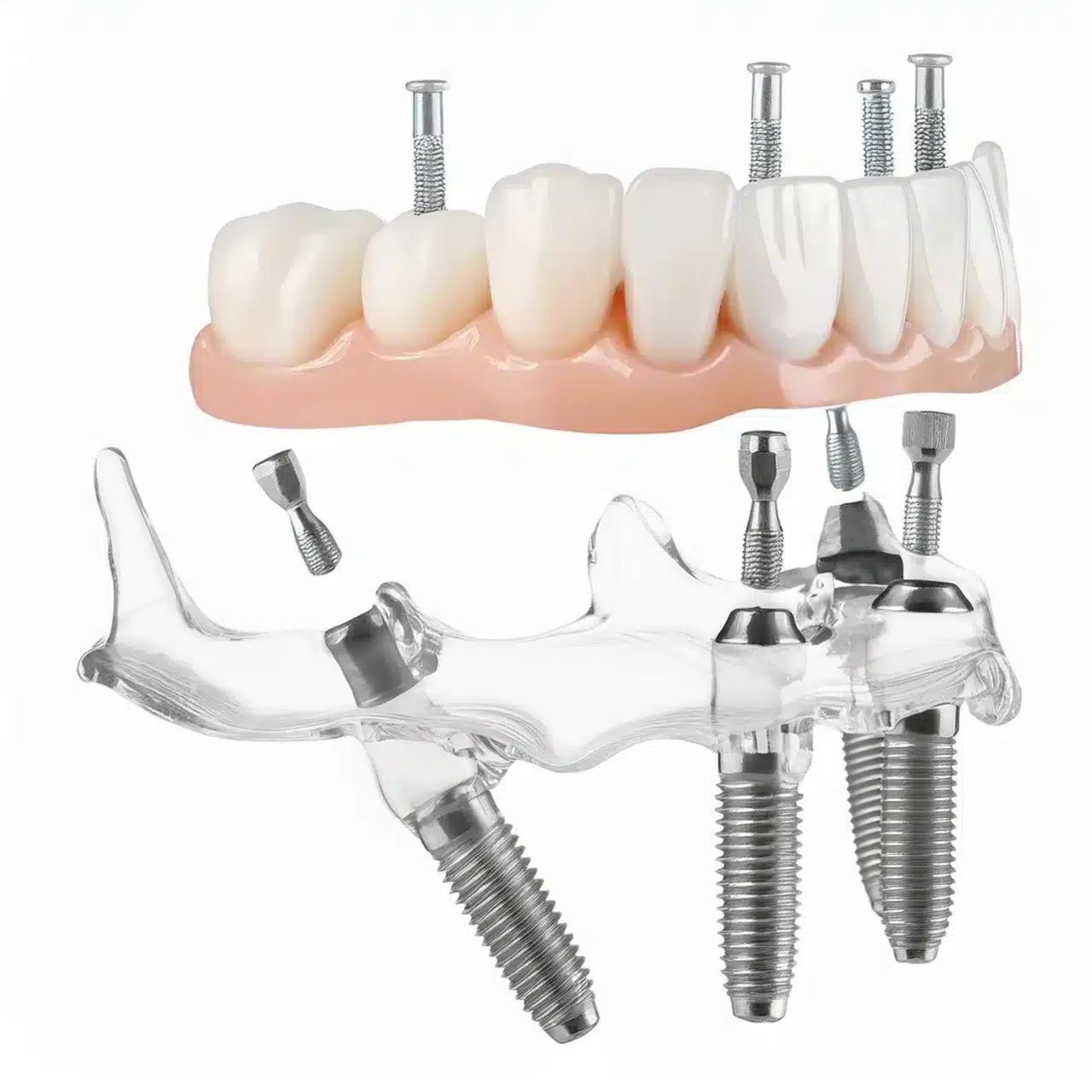How long do dental implants last? is a question many of us ask when considering this popular tooth replacement option for missing teeth.
If you’re wondering about the durability and longevity of dental implants, you’re not alone; understanding their lifespan is key to making informed decisions about your oral health.
How Long Do Dental Implants Last?
Dental implants last 20 to 30 years, with many lasting a lifetime when properly maintained. The titanium implant fused to the jawbone can endure for decades, while the visible crown may need replacement after 10-15 years due to wear. Studies show a 93% survival rate after 17 years. Factors affecting longevity include lifestyle choices and regular dental check-ups.

Factors Affecting Dental Implant Lifelongity
Materiali
The longevity of dental implants is largely dependent on the material used.
Titanium is the most popular material due to its strength and biocompatibility, which ensures high success rate and long-term results.
Implants made from high-quality titanium have shown a survival rate of 94.4% over 20 years for single-unit restorations (1).
The material chosen impacts not only the durability but also the integration with the jawbone, which is key to long-term success of the implant.
Zirconia dental implants are an alternative to titanium, especially for patients with metal allergies, and they offer similar longevity and success rates.
Oral Hygiene and Maintenance
Good oral hygiene is key to dental implant longevity.
Brushing and flossing prevent peri-implantitis, which affects 9.7% of single-unit implants and can lead to bone loss and implant failure (2).
Regular dental check-ups are important to monitor the health of the implant and surrounding tissues. Additionally, teeth grinding, also known as bruxism, can lead to implant failure by causing repetitive jaw muscle activity that increases stress on teeth and jaw, potentially resulting in higher failure rates and loss of bone tissue around dental implants.
Patients who follow a strict oral hygiene routine and attend regular dental visits have fewer implant complications.
Lifestyle Choices
Lifestyle choices impact the lifespan of dental implants.
Smoking for example, has been shown to negatively impact implant success; smokers have higher risk of implant failure compared to non smokers.
The hazard ratio for implant failure is higher in patients with multiple implants who smoke (3).
On the other hand a healthy lifestyle, balanced diet and avoiding bad habits can extend implant lifespan.
Regular exercise and avoiding excessive alcohol consumption also contribute to overall oral health and implant success.
| Material Used | Success Rate (%) Over 20 Years | Impact of Oral Hygiene | Effect of Lifestyle Choices |
|---|---|---|---|
| Titanium | 94.4% | Significant positive impact | Negative impact if smoking |
| Zirkoni | 85.0% | Moderate positive impact | Neutral impact with healthy lifestyle |
Average Lifespan of Dental Implants
Expected Lifespan
Dental implants are known for their durability and longevity and can outlast other dental prosthetics.
On average, dental implants last 20–30 years, some even longer under optimal conditions (4).
The expected lifespan is dependent on several factors, including the material quality, the dentist, and the patient’s maintenance routine.
Studies have shown that implants in healthy individuals with good bone density can have a success rate of 95% over 10 years (5).
This high success rate means, with proper care, implants can be a long-term solution for tooth replacement.

Long-Term Studies and Survival Rates
Long-term studies give us insight into the survival rates of dental implants.
A retrospective study of 10,871 implants over 22 years showed a survival rate of 82.9% at 20 years (6).
This data proves dental implants are a durable option for tooth replacement.
The study also showed that implants in patients who attended regular dental check-ups and followed oral hygiene routine had higher survival rates.
Another study found that implants supporting mandibular fixed dental prostheses had a survival rate of 90.2% over 30 years (7).
These results highlights the importance of ongoing care and monitoring to extend the lifespan of dental implants.

Tips to Extend Dental Implant Lifespan
Regular Dental Check-Ups
A thorough dental implants consultation with a dental professional is necessary to determine suitability and develop a personalized treatment plan
Regular dental check-ups are important to maintain the health and lifespan of dental implants.
These visits allow the dentist to monitor the implant and surrounding tissues and address any potential problems before they become big.
A study showed that patients who attended regular dental check-ups had fewer implant complications compared to those who didn’t (8).
Regular check-ups also provide an opportunity for professional cleaning, which is important to prevent peri-implantitis and ensure long-term success of the implant.
Oral Hygiene Practices
Oral hygiene practices are important to extend the lifespan of dental implants.
This includes regular brushing and flossing to prevent plaque buildup and gum health.
A study showed the importance of oral hygiene in preventing peri-implantitis, which affects 16–28% of implants (9).
Using a soft bristled toothbrush and avoiding abrasive toothpaste can also prevent damage to the implant and surrounding tissue.

Lifestyle Choices
Lifestyle choices play a big role in the lifespan of dental implants.
Avoiding harmful habits like smoking and excessive alcohol consumption can reduce the risk of implant failure.
A study showed smokers had a higher risk of implant failure compared to non-smokers (10).
Also, a balanced diet rich in nutrients can support overall oral health and contribute to the long-term success of dental implants.
The Dental Implant Step-by-Step Process & Timeline involves several stages, including implant placement, healing and osseointegration, abutment placement, and crown fitting.
Each stage is critical for the long-term success of the implant.
The process begins with the surgical insertion of the implant post into the jawbone, followed by a healing phase where the implant integrates with the bone.
Once healing is complete, the abutment is attached, and the custom-made crown is placed on the abutment.
This process ensures that the dental implant is stable and functional, providing a natural-looking and feeling tooth replacement.
| Tip | Përshkrimi | Impact on Longevity |
|---|---|---|
| Regular Dental Check-Ups | Visit your dentist regularly for professional cleanings and to monitor implant health. | Significantly reduces the risk of complications such as peri-implantitis. |
| Proper Oral Hygiene Practices | Brush and floss daily to prevent plaque buildup and maintain gum health. | Prevents bone loss and implant failure by maintaining healthy gums. |
| Healthy Lifestyle Choices | Avoid smoking and excessive alcohol consumption; maintain a balanced diet. | Enhances overall oral health and supports long-term implant success. |
Përfundim & Çështje kryesore
Marrëdhëniet kryesore:
Implantet dentare are a durable option for tooth replacement for 20–30 years.
Material quality (titanium) is important for success and longevity.
Regular check-ups and oral hygiene are important to prevent peri-implantitis.
Lifestyle choices (stop smoking and a balanced diet) affect implant longevity.
konkluzioni:
In summary, dental implants are a reliable and long-term solution for tooth replacement.
By focusing on quality material, good oral hygiene, and a healthy lifestyle, patients can ensure their implants will be functional and effective for decades.
Regular monitoring and care is key to extending their lifespan and oral health.

Pyetjet e shpeshta
Referencat
Jung Min Cho et al. Long-term steroid therapy and Denosumab treatment leading to peri-implant medication-related osteonecrosis of the jaw: a case report. J Dent Implant Res. 2024;43(3):27-32.
Neni: Terapia afatgjatë me steroide dhe trajtimi me Denosumab që çojnë në osteonekrozë të nofullës të lidhur me mjekimin peri-implant: një raport rastiHae-Seok Lee et al. A retrospective study on the factors associated with marginal bone loss of short implants placed in posterior regions. J Dent Implant Res. 2023;42(3):46-52.
Neni: Një studim retrospektiv mbi faktorët që lidhen me humbjen marxhinale kockore të implanteve të shkurtra të vendosura në rajonet e pasmeOla Abdelsamad Amin et al. Assessment of stability of early-loaded nano-coated hydroxyapatite implants in posterior maxilla. J Dent Implant Res. 2024;43(1):1-8.
Neni: Vlerësimi i stabilitetit të implanteve hidroksiapatite të veshura me nano të ngarkuara herët në maksillën e pasmeWindael S et al., The Long-Term Effect of Smoking on 10 Years’ Survival and Success of Dental Implants: A Prospective Analysis of 453 Implants in a Non-University Setting. J Clin Med. 2020;9(4).
Neni: The Long-Term Effect of Smoking on 10 Years’ Survival and Success of Dental Implants: A Prospective Analysis of 453 Implants in a Non-University SettingTurkyilmaz I, Tözüm TF. 30-Year Outcomes of Dental Implants Supporting Mandibular Fixed Dental Prostheses: A Retrospective Review of 4 Cases. Implant Dent. 2015;24(5):620-4.
Neni: 30-Year Outcomes of Dental Implants Supporting Mandibular Fixed Dental Prostheses: A Retrospective Review of 4 CasesSetzer FC, Kim S. Comparison of Long-term Survival of Implants and Endodontically Treated Teeth. J Dent Res. 2014;93(1):19-26.
Neni: Comparison of Long-term Survival of Implants and Endodontically Treated TeethGoiato MC. Longevity of dental implants in type IV bone: a systematic review. Int J Oral Maxillofac Surg. 2014;43(9):1101-7.
Neni: Longevity of dental implants in type IV bone: a systematic reviewWindael S et al., The Long-Term Effect of Smoking on 10 Years’ Survival and Success of Dental Implants: A Prospective Analysis of 453 Implants in a Non-University Setting. J Clin Med. 2020;9(4).
Neni: The Long-Term Effect of Smoking on 10 Years’ Survival and Success of Dental Implants: A Prospective Analysis of 453 Implants in a Non-University SettingTurkyilmaz I, Tözüm TF. 30-Year Outcomes of Dental Implants Supporting Mandibular Fixed Dental Prostheses: A Retrospective Review of 4 Cases. Implant Dent. 2015;24(5):620-4.
Neni: 30-Year Outcomes of Dental Implants Supporting Mandibular Fixed Dental Prostheses: A Retrospective Review of 4 CasesSetzer FC, Kim S. Comparison of Long-term Survival of Implants and Endodontically Treated Teeth. J Dent Res. 2014;93(1):19-26.
Neni: Comparison of Long-term Survival of Implants and Endodontically Treated Teeth


